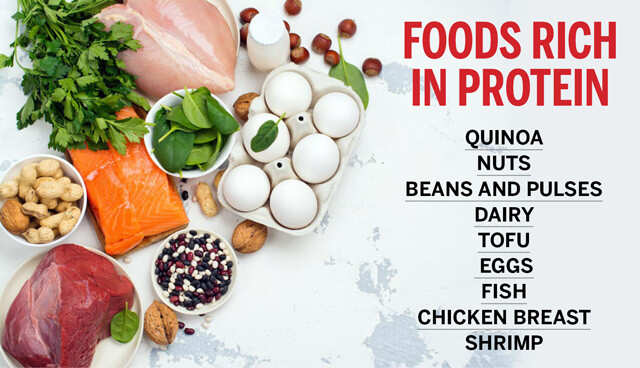Introduction
Welcome to WellHealthOrganic.com, your trusted resource for natural health and wellness advice. In this comprehensive guide, we delve into the world of vegetarian protein sources, providing insights into nourishing your body with plant-based foods. Whether you’re a committed vegetarian, exploring plant-based options, or simply seeking to incorporate more plant proteins into your diet, this guide offers valuable information to support your journey towards optimal health. Join us as we explore a diverse array of vegetarian protein sources and uncover the nutritional benefits they provide.
Understanding the Importance of Protein
Protein is an essential macronutrient vital for various bodily functions, including muscle repair and growth, hormone production, and immune function. While animal products are traditional sources of protein, there is a wealth of plant-based alternatives that offer comparable nutritional benefits.
Exploring Vegetarian Protein Sources
- Legumes:
- Beans: Black beans, kidney beans, chickpeas, and lentils are excellent sources of protein, fiber, and essential nutrients.
- Soybeans: Edamame, tofu, and tempeh are rich in protein and contain all essential amino acids, making them complete protein sources.
- Grains:
- Quinoa: This pseudo-grain is a complete protein source and also provides fiber, vitamins, and minerals.
- Brown Rice: A staple in many cuisines, brown rice contains protein and is a versatile ingredient in vegetarian meals.
- Nuts and Seeds:
- Almonds, walnuts, cashews, pumpkin seeds, and chia seeds are nutritious sources of protein, healthy fats, and essential nutrients.
- Dairy and Dairy Alternatives:
- Greek yogurt, cottage cheese, and cheese are protein-rich dairy options.
- Plant-based milk alternatives like almond milk, soy milk, and oat milk are fortified with protein and offer dairy-free options.
- Vegetables:
- Spinach, broccoli, Brussels sprouts, peas, and kale contain protein and a host of other essential nutrients.
- Plant-based Protein Powders:
- Pea protein, rice protein, hemp protein, and soy protein powders offer convenient options to boost protein intake in smoothies and recipes.
Incorporating Vegetarian Protein into Your Diet
- Balanced Meals: Create balanced meals by combining protein-rich foods with whole grains, vegetables, and healthy fats.
- Snack Options: Enjoy protein-rich snacks like hummus with vegetables, Greek yogurt with fruit, or nuts and seeds.
- Meal Prep: Plan and prepare meals ahead of time to ensure you have nutritious and protein-packed options readily available.
- Recipe Adaptations: Modify your favorite recipes to include vegetarian protein sources, such as substituting tofu for meat in stir-fries or using lentils in soups and stews.
- Dining Out: Choose restaurants that offer vegetarian options or ask for protein-rich ingredients like beans, tofu, or quinoa to be added to your meal.
Benefits of Vegetarian Protein Sources
- Heart Health: Plant-based protein sources are typically lower in saturated fat and cholesterol, promoting heart health.
- Digestive Health: The fiber content in many vegetarian protein sources supports digestive health and regularity.
- Weight Management: Plant-based proteins are often lower in calories and can aid in weight management when incorporated into a balanced diet.
Common Vegetarian Protein Sources In Indian Households
1. Legumes: Beans, Lentils, and Peas
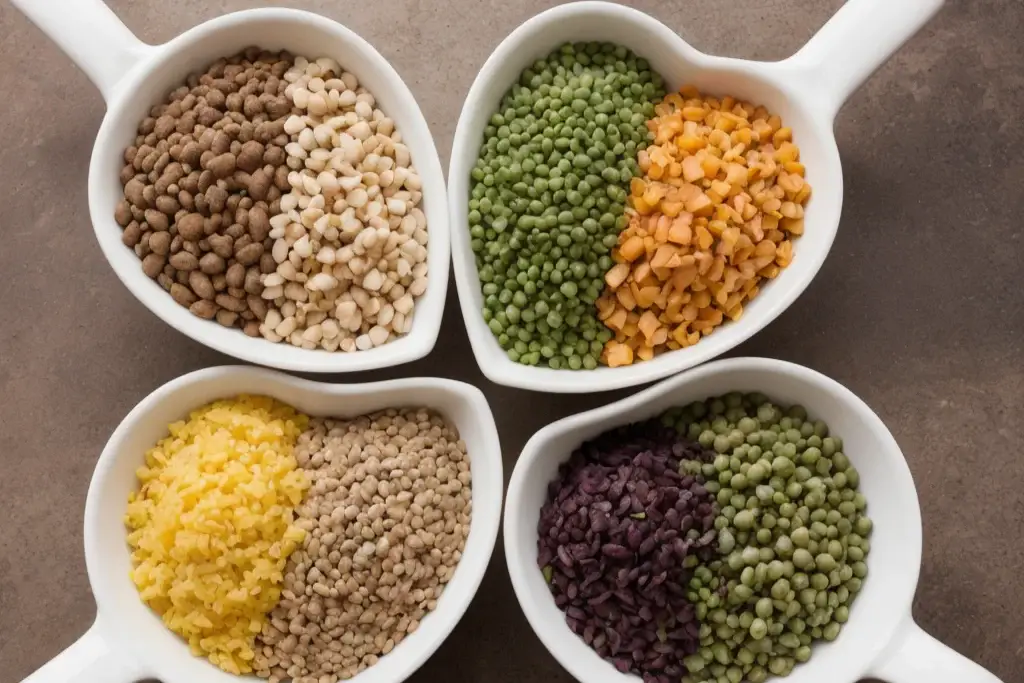
Legumes are a powerhouse of protein, fiber, and various nutrients.
Research published in the Journal of the Academy of Nutrition and Dietetics highlights legumes as not only a rich source of protein but also beneficial for our heart health and diabetes prevention.
Nutritional Profile of Common Indian Legumes: Vegetarian Protein Sources
| Item | Protein Content (per 100g) | Calories (per 100g) | Fiber Content (per 100g) | Important Micronutrient |
|---|---|---|---|---|
| Kidney Beans | 8.9g | 127 | 6.4g | Folate |
| Black Gram | 25g | 341 | 4.8g | Iron |
| Green Peas | 5g | 81 | 5.1g | Vitamin C |
| Chickpeas | 19g | 364 | 17g | Iron |
| Mung Beans | 24g | 347 | 16.3g | Folate |
| Red Lentils | 26g | 116 | 7.9g | Folate |
| Soybeans | 36g | 446 | 9.3g | Iron |
2. Quinoa: The Complete Protein

Unlike many plant proteins, quinoa seeds are considered a complete protein, containing all nine essential amino acids.
A study in the Journal of Current Opinion in Food Science points out quinoa’s protein quality and its role in improving the nutritional content of a vegetarian diet.
Nutritional Content of Quinoa: Vegetarian Protein Sources
| Nutrient | Amount per 100g |
|---|---|
| Protein | 4.4g |
| Calories | 120 |
| Fiber | 2.8g |
| Magnesium | 64mg |
| Iron | 1.5mg |
| Calcium | 17 mg |
3. Nuts and Seeds: Compact Nutrient Dynamos
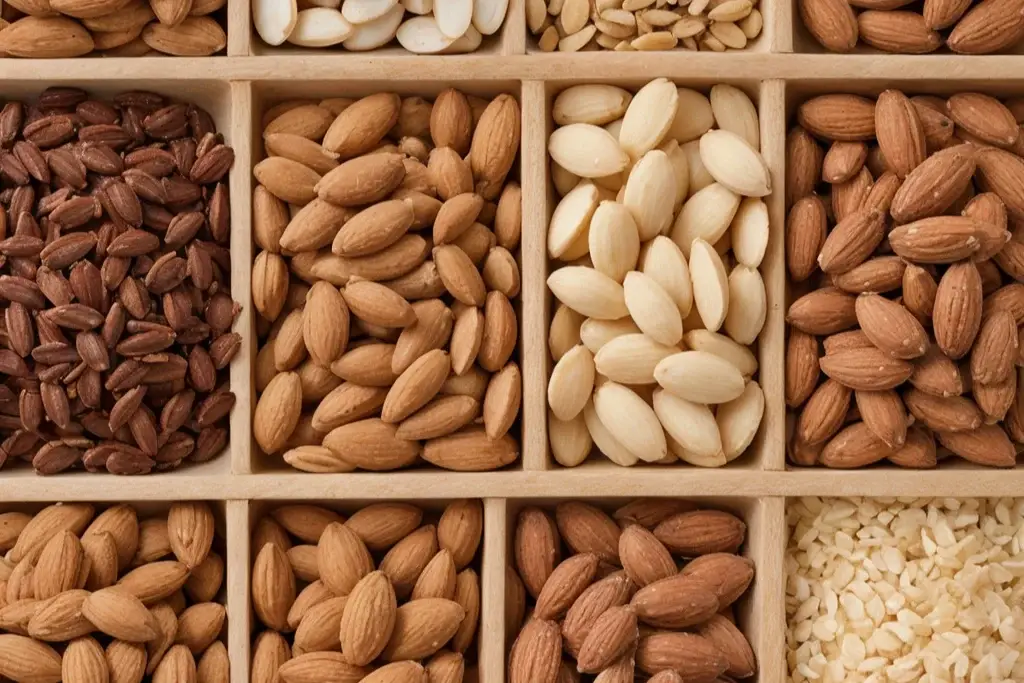
Nuts and seeds are not only protein-rich but also provide healthy fats, vitamins, and minerals. Almonds, for example, offer around 6 grams of protein per ounce.
The Americal diabetes association notes that incorporating nuts into your diet can lower the risk of cardiovascular disease.
Nutritional and Health Benefits of Common Nuts and Seeds: Vegetarian Protein Sources
| Nut/Seed Type | Protein Content per 100g | Health Benefits |
|---|---|---|
| Almonds | 21.4g | High in Vitamin E, reduces heart disease risk |
| Walnuts | 14.6g | Rich in Omega-3, supports brain health |
| Pistachios | 20.5g | Lowers LDL cholesterol, good for heart health |
| Cashews | 17.4g | Magnesium-rich supports heart and liver health |
| Flaxseeds | 18g | High in Omega-3 fatty acids, anti-inflammatory |
| Pumpkin Seeds | 30g | Magnesium-rich, supports heart and liver health |
| Chia Seeds | 17g | High in fiber, promotes weight management |
4. Soy Products: Tofu, Tempeh, and Edamame
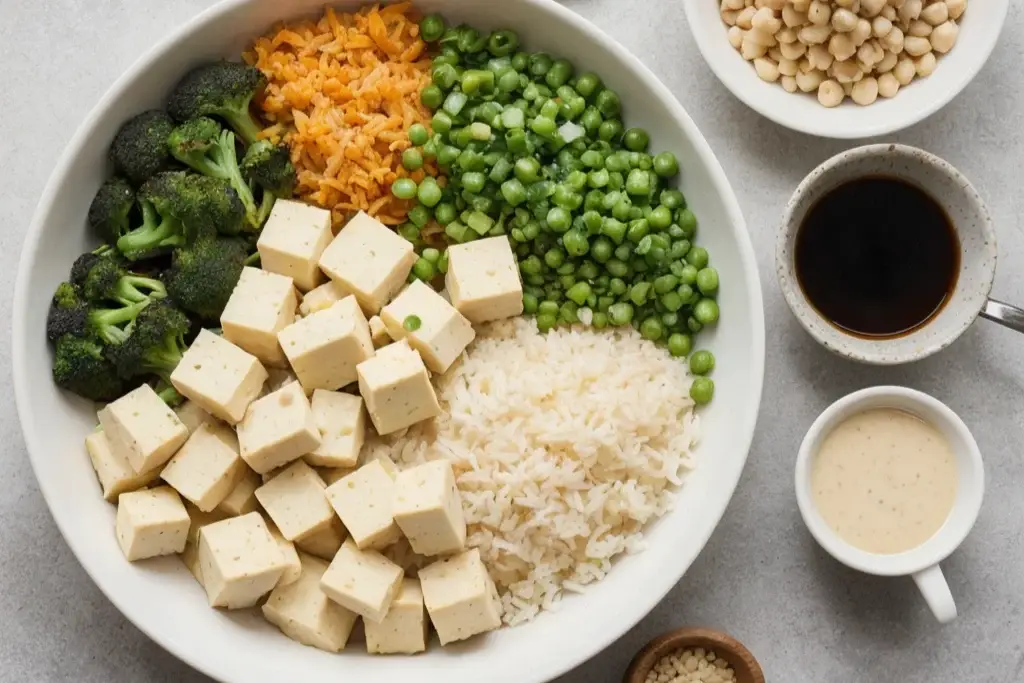
Soy products are versatile, high in protein, and can be great meat substitutes. Tofu, for instance, packs about 10 grams of protein per half-cup serving.
A report published in the American Journal of Clinical Nutrition supports soy’s role in a healthy vegetarian diet, emphasizing its nutritional benefits and versatility.
Wellhealthorganic Vegetarian Protein Sources:
Nutritional Profile and Benefits of Common Soy Products: Vegetarian Protein Sources
| Soy Product | Protein Content per 100g | Calories per 100g | Key Nutrients | Dietary Benefits |
|---|---|---|---|---|
| Tofu | 17g | 144 | High in calcium and iron | Supports bone health, good for heart health |
| Tempeh | 20g | 192 | Rich in protein and fiber | Aids digestive health, beneficial for muscle growth |
| Edamame | 12g | 121 | High in fiber, vitamin K, folate | Lowers cholesterol, may help in blood pressure management |
5. Dairy Products: Cheese, Yogurt, and Milk
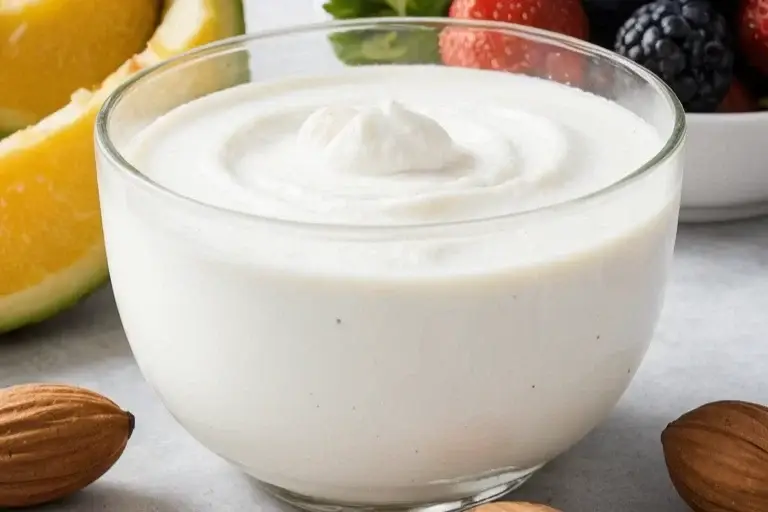
For lacto-vegetarians, dairy products are a significant protein source. Greek yogurt can contain up to 20 grams of protein per cup.
Research published in the journal Nutrients outlines the role of dairy in providing high-quality protein and essential nutrients.
Nutritional Profile of Common Dairy Products: Cheese, Yogurt, Buffalo Milk, Cow Milk and Goat Milk: Vegetarian Protein Sources
| Dairy Product | Protein Content per 100g | Calories per 100g | Key Nutrients | Health Benefits |
|---|---|---|---|---|
| Cheese | 25g | 429 | High in calcium, phosphorus, Vitamin B12 | Supports bone health, and may lower blood pressure |
| Yogurt | 3.5g | 61 | Rich in calcium, probiotics, Vitamin B2, Vitamin B12 | Supports digestive health, boosts immune system |
| Buffalo Milk | 4.3g | 117 | Higher in fat, calcium, and protein than cow milk | Supports bone strength, more beneficial for growth |
| Cow Milk | 3.2g | 67 | High in calcium, Vitamin D, potassium, Vitamin B12 | Supports bone health, may lower blood pressure |
| Goat Milk | 3.3g | 72 | High in calcium, phosphorus, and essential fatty acids | Supports digestive health, enhances nutrient absorption, often easier to digest than cow’s milk. |
Conclusion
Vegetarian protein sources offer a wealth of nutritional benefits and can be easily incorporated into a balanced diet. By diversifying your protein sources and exploring plant-based options, you can support your health and well-being while enjoying delicious and satisfying meals. Visit WellHealthOrganic.com for more tips, recipes, and resources to help you thrive on a vegetarian diet.

